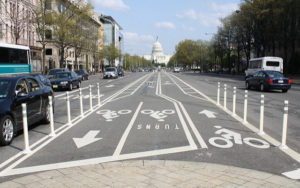A 1916 rule enacted by President Woodrow Wilson’s administration is curbing 21st-century transportation innovations that could improve safety and quality on the nation’s major roadways, the American Road and Transportation Builders Association (ARTBA) said in Sept. 5 testimony submitted to the House Highways and Transit Subcommittee.
At issue is 23 CFR 635.411, a 102-year-old federal regulation that prohibits state and local governments from using patented or proprietary products on highway and bridge projects that receive federal funding unless those products qualify for limited exceptions. The rule was adopted by the U.S. Department of Agriculture, which then managed the emerging federal-aid highway program, over the objections of both the American Road Builders Association, as ARTBA was then known, and the American Association of State Highway Officials.
In its testimony, ARTBA told the subcommittee that since many new technologies—particularly those marking a significant advance in quality, performance or durability—incorporate intellectual property protected by patents or proprietary processes, 23 CFR 635.411 inevitably impedes the development and deployment of those same innovations that various congressional and U.S. Department of Transportation (DOT) initiatives are intended to foster.
“It is also important to point out that when states outright disallow a patented or proprietary product, they may be preventing a transformative solution to a serious problem from taking place in a timely manner,” ARTBA said in its testimony. “For example, every great paradigm shift in the bridge world originated from a patented idea or intellectual property, generally marketed as a proprietary product.”
ARTBA added, “The goal of federal highway policy should be to deliver the safest, most efficient, and fiscally responsible highway and bridge network possible. Achieving that goal must include a thoughtful assessment of technological and other advances to ensure infrastructure development strategies are in fact delivering the best possible outcome as opposed to the widest achievable outcome. The practical effect of the existing proprietary and patented products rule, however, impedes that process and can potentially deny the traveling public a better service.”
The association noted other federal agencies, such as the U.S. Department of Defense, have set up procurement systems that allow for the appropriate use of sole-source contracts for patented or proprietary products to accomplish their missions.
“The goal of federal transportation policy should be to promote innovation and enable ideas and products aimed at building a better transportation network as efficiently as possible—not to protect the status quo,” ARTBA said in its testimony. “While DOT is to be commended for moving in the right direction in a number of areas, the proprietary products rule is an antiquated regulation that has no place in today’s marketplace of ideas and needs to be corrected as soon as possible.”
In March ARTBA formally petitioned the DOT to repeal 23 CFR 635.411 and is awaiting a response from the agency.
Established in 1902, ARTBA represents the U.S. transportation construction industry before Congress, the White House, federal agencies, courts, news media and the general public.
 TEXTILES.ORG
TEXTILES.ORG


